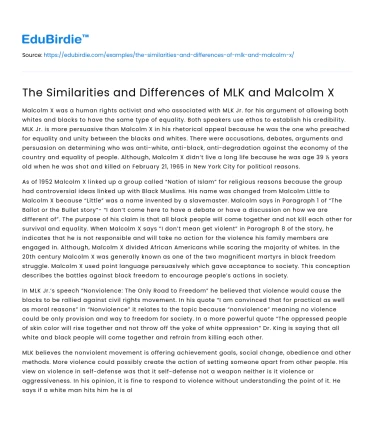Malcolm X was a human rights activist and who associated with MLK Jr. for his argument of allowing both whites and blacks to have the same type of equality. Both speakers use ethos to establish his credibility. MLK Jr. is more persuasive than Malcolm X in his rhetorical appeal because he was the one who preached for equality and unity between the blacks and whites. There were accusations, debates, arguments and persuasion on determining who was anti-white, anti-black, anti-degradation against the economy of the country and equality of people. Although, Malcolm X didn’t live a long life because he was age 39 ½ years old when he was shot and killed on February 21, 1965 in New York City for political reasons.
As of 1952 Malcolm X linked up a group called “Nation of Islam” for religious reasons because the group had controversial ideas linked up with Black Muslims. His name was changed from Malcolm Little to Malcolm X because “Little” was a name invented by a slavemaster. Malcolm says in Paragraph 1 of “The Ballot or the Bullet story”- “I don’t come here to have a debate or have a discussion on how we are different of”. The purpose of his claim is that all black people will come together and not kill each other for survival and equality. When Malcolm X says “I don’t mean get violent” in Paragraph 8 of the story, he indicates that he is not responsible and will take no action for the violence his family members are engaged in. Although, Malcolm X divided African Americans while scaring the majority of whites. In the 20th century Malcolm X was generally known as one of the two magnificent martyrs in black freedom struggle. Malcolm X used point language persuasively which gave acceptance to society. This conception describes the battles against black freedom to encourage people’s actions in society.
Save your time!
We can take care of your essay
- Proper editing and formatting
- Free revision, title page, and bibliography
- Flexible prices and money-back guarantee
In MLK Jr.’s speech “Nonviolence: The Only Road to Freedom” he believed that violence would cause the blacks to be rallied against civil rights movement. In his quote “I am convinced that for practical as well as moral reasons” in “Nonviolence” it relates to the topic because “nonviolence” meaning no violence could be only provision and way to freedom for society. In a more powerful quote “The oppressed people of skin color will rise together and not throw off the yoke of white oppression” Dr. King is saying that all white and black people will come together and refrain from killing each other.
MLK believes the nonviolent movement is offering achievement goals, social change, obedience and other methods. More violence could possibly create the action of setting someone apart from other people. His view on violence in self-defense was that it self-defense not a weapon neither is it violence or aggressiveness. In his opinion, it is fine to respond to violence without understanding the point of it. He says if a white man hits him he is allowed to fight back but he would still get in trouble for “fighting back”.
Did you like this example?
Make sure you submit a unique essay
Our writers will provide you with an essay sample written from scratch: any topic, any deadline, any instructions.
Cite this paper
-
APA
-
MLA
-
Harvard
-
Vancouver
The Similarities and Differences of MLK and Malcolm X.
(2022, Jun 29). Edubirdie. Retrieved December 21, 2024, from https://edubirdie.com/examples/the-similarities-and-differences-of-mlk-and-malcolm-x/
“The Similarities and Differences of MLK and Malcolm X.” Edubirdie, 29 Jun. 2022, edubirdie.com/examples/the-similarities-and-differences-of-mlk-and-malcolm-x/
The Similarities and Differences of MLK and Malcolm X. [online].
Available at: <https://edubirdie.com/examples/the-similarities-and-differences-of-mlk-and-malcolm-x/> [Accessed 21 Dec. 2024].
The Similarities and Differences of MLK and Malcolm X [Internet]. Edubirdie.
2022 Jun 29 [cited 2024 Dec 21].
Available from: https://edubirdie.com/examples/the-similarities-and-differences-of-mlk-and-malcolm-x/
copy






 Stuck on your essay?
Stuck on your essay?

